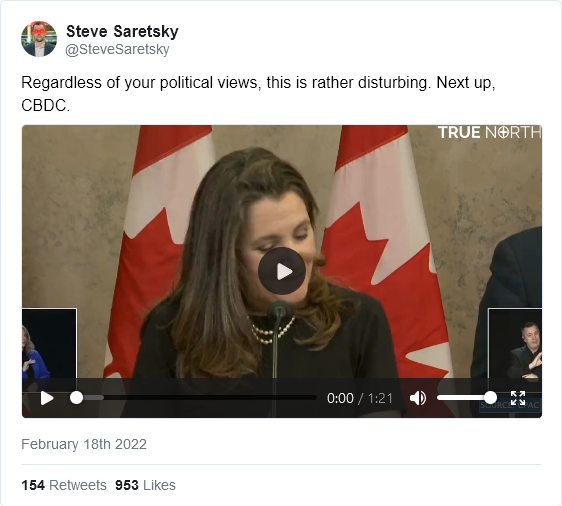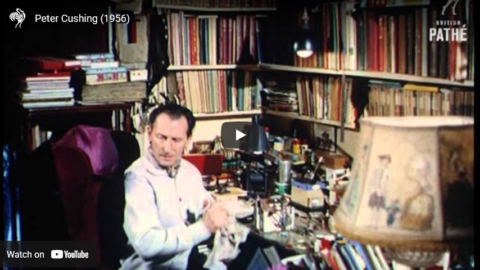World War Two
Published 22 Feb 2022Humanity has spent millennia developing ever more efficient ways to kill. This reaches its apogee in WWI and WWII, the most terrible conflicts in human history. Broken bodies bring with them broken minds. The trauma of war brings with it the mysteries of shell shock, war neurosis and PTSD.
(more…)
February 23, 2022
From Shell Shock to PTSD – Understanding the Trauma of War – WW2 Special
If the protest is over, why does the government believe it still needs the Emergencies Act powers?
Depressingly, the House of Commons approved Justin Trudeau’s use of the Emergencies Act, and various officials at federal and municipal level have continued rhetorical scorched-earth statements to the media and directly on social media about the protest. If the stated need for those emergency powers has abated, why are the feds still pushing to hang on to them?
In the Toronto Sun, former Liberal Party president Stephen LeDrew is scathing in his criticisms of Trudeau:
Just walk or drive through cities and villages and the countryside, and see the Canadian flags — paired with signs expressing vehement disapproval of our federal government. Loyal Canadians are fed up with their federal government.
And one person is responsible for this — Prime Minister Justin Trudeau.
He has drastically altered Canadian institutions and norms so considerably that usually calm people are raising their voices in protest.
The core of the protestors in Ottawa and other Canadian centres were angry not only about government heavy-handedness in its pandemic policies, but also the changes being brought about by Trudeau.
He has cheapened public discourse and public life.
He talks so high-minded, yet has a lifelong history of deplorable acts.
He has arbitrarily ruined the lives of many other people who have been supposedly guilty of far less egregious acts than have been proven by photographs against him — perhaps to deflect his own guilt?
Does “do as I say, not as I do” strike home? How about “one standard for the masses, and another for the elites like me?”
His intolerance, and high-handed and ill-founded rectitude has led many to regard the government with disdain, and doubt its ability to get things right.
And now his decision to not only invoke the Emergencies Act (which most minds — those not cowardly beholden to Trudeau — agree was not necessary to get the job done in Ottawa), but to keep it in force for an undetermined period (to “hunt down” some Canadians to charge them with mischief?), has shown precisely how inappropriate Trudeau really is for this high office.
David Warren is, in his own words, modestly optimistic despite the current political situation here in the Trudeaupian Maple Dictatorship:
Our provincial and Dominion governments went formally off the rails of settled law in response to the Batflu epidemic, two years ago. They arrogated to themselves powers never previously claimed by our politicians, except in wartime — to regulate the smallest details of everyday life. It began with “two weeks to disable the Constitution and Human Rights”, both here, and under Trump across the border. The “vaccine passports” were merely the latest crass obscenity of this political and bureaucratic class.
I am modestly optimistic about the course of events, however. True, I must expect direct persecution by the Party of the Dictatorship, which is out to settle scores. But the Freedom Convoy sent to the national capital has shown, for the first time in many years, that a substantial number of Canadians will resist.
That a majority cannot cope with freedom, and are likely to squall when exposed to it, I take for granted. Humans have always been “conservative”, in this worst possible sense. But the splendid Canadian reaction to tyranny went beyond what I had hoped for. In particular, many articulate voices have been raised to speak truth — in the dark fever-swamp of lies in which our culture, and by extension our economy, is choking. This will make a huge difference. The sun is distantly shining; and the spring can once again be imagined. Sunlight is the best disinfectant, to filth accumulating in public life.
In 1993, the then-governing “Progressive Conservatives” were reduced from a majority, to two seats in Parliament, and then to extinction at the “federal” level. Men of good will shall be working towards a similar result, at the next general election, in which the Liberals and NDP should be annihilated.
While my dislike of Trudeau runs extremely high, I didn’t have much of an opinion about Chrystia Freeland, the deputy PM, until very recently. Apparently, I’m way behind the curve on disliking “the Nurse Ratched of the New World Order”:
Sorkin’s Visa piece is suddenly relevant again, after fellow former finance reporter Chrystia Freeland — someone I’ve known since we were both expat journalists in Russia in the nineties — announced last week that her native Canada would be making Sorkin’s vision a reality. Freeland arouses strong feelings among old Russia hands. Before the Yeltsin era collapsed, she had consistent, remarkable access to gangster-oligarchs like Boris Berezovsky, who appeared in her Financial Times articles described as aw-shucks humans just doing their best to make sure “big capital” maintained its “necessary role” in Russia’s political life. “Berezovsky was one of several financiers who came together in a last-ditch attempt to keep the Communists out of the Kremlin” was typical Freeland fare in, say, 1998.
Then the Yeltsin era collapsed in corrupt ignominy and Freeland immediately wrote a book called Sale of the Century that identified Yeltsin’s embrace of her former top sources as the “original sin” of Russian capitalism, a “Faustian bargain” that crippled Russia’s chance at true progress. […]
Years later, she is somehow Canada’s Finance Minister, and what another friend from our Russia days laughingly describes as “the Nurse Ratched of the New World Order”. At the end of last week, Minister Freeland explained that in expanding its Financial Transactions and Reports Analysis Centre of Canada (FINTRAC) program, her government was “directing Canadian financial institutions to review their relationships with anyone involved in the illegal blockades.”
The Emergencies Act contains language beyond the inventive powers of the best sci-fi writers. It defines a “designated person” — a person eligible for cutoff of financial services — as someone “directly or indirectly” participating in a “public assembly that may reasonably be expected to lead to a breach of the peace.” Directly or indirectly?
She went on to describe the invocation of Canada’s Emergencies Act in the dripping-fake tones of someone trying to put a smile on an insurance claim rejection, with even phrases packed with bad news steered upward in the form of cheery hypotheticals. As in, The names of both individuals and entities as well as crypto wallets? Have been shared? By the RCMP with financial institutions? And accounts have been frozen? As she confirmed this monstrous news about freezing bank accounts, Freeland burst into nervous laughter, looking like Tony Perkins sharing a cheery memory with “mother”:
One of the oddest moments during the weeks-long protest in Ottawa was when “counter-protesters” showed up, but as one observer noted, they seemed to be at the wrong protest:
At first glance, it looked like one of the strangest, most incongruous moments of the great trucker uprising of 2022. There were the truckers and their working-class allies, in Ottawa, loudly agitating against Justin Trudeau’s vaccine mandates, when a bunch of hyper-woke, definitely not working-class counter-protesters rocked up to rail against this horn-honking throng. And what did they chant, these painfully PC counter-protesters? “Trans rights are human rights”, that’s what. As clear as anything, these supposed leftists, seemingly horrified by the sight of working-class men and women fighting for their rights, engaged in arguably the most striking non-sequitur of the 2020s so far – they brought transgenderism into an issue that has nothing whatsoever to do with transgenderism.
The truckers have said nothing about trans people. We have no idea what these pissed-off working-class drivers think about genderfluidity and all the rest. My hunch is that they think it’s nonsense. But we don’t know. This vast gathering of truckers and their supporters, which has so rattled the Trudeau administration and inspired copycat revolts around the world, is completely unrelated to sex changes and pronouns and the right of born men to beat women in sports and all the other things that fall under the banner of “trans rights” these days. So, understandably, many people were perplexed by the counter-protesters’ chant. “I don’t think they are at the right protest”, said one observer. Memes emerged, saying: “Truckers: Freedom for all! Counter-protest: Trans rights are human rights. Truckers: What??” What indeed.
[…]
In other words, that strange “trans rights” counter-protest captured a larger truth about the truckers’ uprising. Which is that wokeness has enabled the Canadian state’s exceptionally intolerant and violent assault on this working-class uprising. Many of us have marvelled at the allegedly radical left’s studious ignoring of the Canadian working-class revolt against the bourgeois state. But as more and more time passes, it has become clear that the left has not in fact ignored this globally important protest – rather, it has played a key role in legitimising state tyranny against the protesters, in providing the political justification for the Ottawa police’s violent wielding of truncheons and their crushing of working people. The woke are not mere bystanders, not mere wide-eyed shoulder-shruggers to this working-class uprising. On the contrary, they have been the moral facilitators of the state’s classist violence against the truckers and their allies.
Peter Cushing (1956)
British Pathé
Published 14 Apr 2013Kensington, London.
M/S of actor Peter Cushing sitting at his desk looking at papers in his hand. He takes a model toy soldier on a horse and compares it with its drawing. He puts it back and takes another toy soldier. C/U of his hand painting a white belt on the little soldier’s uniform. C/U on his eyes as he works — he must have a good eyesight to do this!
Peter Cushing, enthusiastic member of Model Soldier Society, collects, makes and plays with toy soldiers from all periods of military history. He plays with his toys in accordance to the rules laid down by H.G. Wells in his book Little Wars. M/S of Mr Cushing getting off his chair, approaching a little battlefield laid out on the floor. He organises the battlefield to match a map in his hand.
Voiceover tells the audience that many of historical figures played this game, for example Napoleon [obv. not following the rules devised by Mr. Wells]. It engages the mind of a person as much as the game of chess, which means it is not as simple as it looks. M/S of Mr Cushing kneeling on the floor, putting a horse drawn carriage next to a little house. Top panning shot reveals his little battlefield: soldiers, huts, horses, trees, farms …
M/S of Mr Cushing taking a cigarette, putting it in his mouth and lighting it while observing the battlefield. C/U shot of H. G. Wells’ book Little Wars.
A VIDEO FROM BRITISH PATHÉ. EXPLORE OUR ONLINE CHANNEL, BRITISH PATHÉ TV. IT’S FULL OF GREAT DOCUMENTARIES, FASCINATING INTERVIEWS, AND CLASSIC MOVIES. http://www.britishpathe.tv/
British Pathé also represents the Reuters historical collection, which includes more than 136,000 items from the news agencies Gaumont Graphic (1910-1932), Empire News Bulletin (1926-1930), British Paramount (1931-1957), and Gaumont British (1934-1959), as well as Visnews content from 1957 to the end of 1984. All footage can be viewed on the British Pathé website.
H/T to Jon Salway for the link.
QotD: Debunking the “Spartan one-man-army” myth
… the Spartans, like all hoplites, were oriented very strongly towards group combat. The one-man-army is simply not how they fought, nor how they ever intended to fight.
Well, ok, perhaps they fought in groups, but were individually better at it. There is something to this. Multiple sources – most notably Xenophon stresses the greater degree of physical fitness that the Spartiates display (Xen. Lac. 4.5, 5.9). The Spartiates were rich after all, so they were well fed and able to build muscle accordingly; they also had a pretty active life-style (mostly things like sport-hunting) and kept athletically active. Chances are the average Spartiate was thus larger and fitter than the average hoplite – although again, the other Lakedaemonians in the phalanx (perioikoi, hypomeiones, mothakes, neodamodes, even helots fighting as hoplites) would probably balance out this effect to at least some degree (more strongly as time went on and the number of Spartiates shrunk!)
But what about martial skills and combat expertise? The fact is, there isn’t much evidence for a Spartan military training regime – certainly nothing like what the Romans had, or even what later Hellenistic Greek poleis set up. We’ve already discussed the agoge and you will note that at no point did swordsmanship, spear use, shield use, or anything of the like come up. There is, to be fair, some mock battles with fennel stalks in place of spears and some war-dances which may have served to mimic combat, but the agoge isn’t a training program, it’s an indoctrination program. Plutarch and Xenophon – who describe it – are quite clear on this: the point is to produce men who are obedient to the laws and subservient to the community (Xen. Lac. 2.10-11; Plut. Lyc. 25.3). Any advantages to military quality are evidently secondary (e.g. Xen. Lac. 2.7).
Xenophon himself notes – in the words of Cyrus (who he presents as an ideal ruler) – that hoplite-style warfare in close-combat required little practice (Xen. Cyrop. 2.1.9-16). And I want to stress two things about this statement: first that Xenophon had seen a lot of hoplite battle when he knew this and was in a position to know and second that he had also seen a lot of Sparta. It is hard to imagine Xenophon – with his Laconophilia – saying that practice for hoplites was unimportant if the Spartans had relied on it heavily. Nevertheless, there he is, saying that all of the movements a hoplite actually needed to perform – blocking with the shield, striking with spear or sword – were instinctive and did not need to be taught or practiced.
Plato provides our first solid evidence for the hoplomachia – practice drills in hoplite warfare – but immediately suggests through the person of Laches that the Spartans, specifically do not practice it (Plat. Lach. 182d-183a), because they think it doesn’t work. There is clearly some practicing with arms in Sparta as elsewhere in Greece (see J. K. Anderson, Military Theory and Practice in the Age of Xenophon (1970), 84-93 for the best discussion of the evidence; note also Wheeler, “Hoplomachia and Greek Dances in Arms” (1982)), but it never approaches the formal weapons drills we see from the Romans, or the complex fighting systems of the late Middle Ages. Nor does Sparta appear to be meaningfully exceptional in this regard; they seem to be exactly as tutored – or untutored – as all the other Greeks.
Nor may we rely on the assumption that the Spartan has more battle experience than his foes. The fact is that Greek poleis went to war fairly regularly and that they tended to bring most of their hoplite class out to battle when they did and as such most Greeks of the hoplite class from anywhere will have likely experienced combat. The Spartans are not unique in this and it is not clear that Sparta fights more often – they murder helots more often, sure, but this is hardly effective preparation for open battle.
(The contrast with Rome is again instructive. Sparta is intermittently at war, but the Roman Republic is continuously at war for all but six years out of five centuries, with the average Roman citizen probably spending upwards of seven years under arms – and this is before the professionalization of the legion. The average Roman free-holding farmer (the technical term is assidui) of the Middle Republic might truthfully have considered Leonidas and his 300 as amateurish by comparison.)
So what can we conclude? Well, the Spartiates are probably, on the whole, better nourished and fitter than their average opponent. If they have an edge in weapons training, it is fairly small – some sort of martial arts experts or superlative weapon-masters they are not. Which, of course they aren’t; the way they fight doesn’t require them to be. Hoplite fighting was never about individual martial excellence or skill, but about holding a position in the formation, supporting and being supported in turn by the shields of the men around you. The hoplite didn’t need to be a spear-master and evidently – we must agree with Xenophon – gained little from becoming so.
Bret Devereaux, “Collections: This. Isn’t. Sparta. Part VI: Spartan Battle”, A Collection of Unmitigated Pedantry, 2019-09-20.






